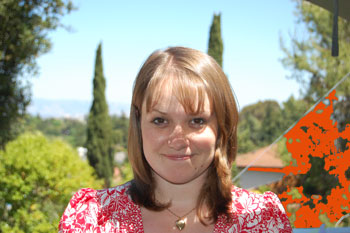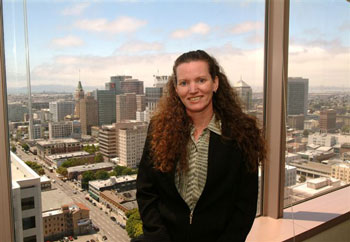 In January, as Jayne Fleming ’00 outlined the challenges of asylum law at a civil rights training seminar, Lindsay Harris ’09 paid rapt attention. Moments after Fleming finished her presentation, Harris raced to the podium in search of advice.
In January, as Jayne Fleming ’00 outlined the challenges of asylum law at a civil rights training seminar, Lindsay Harris ’09 paid rapt attention. Moments after Fleming finished her presentation, Harris raced to the podium in search of advice.
“Lindsay was like a hurricane,” says Fleming, Reed Smith’s west coast pro bono coordinator and leader of the firm’s human rights team. “You could see how passionate she was about these issues. Given our shared interest, I really wanted to work with her. And naturally we became like sisters once we discovered our Boalt connection.”
Harris, who chairs Berkeley Law’s student-run California Asylum Representation Clinic (CARC), promptly sent Fleming a five-page proposal describing CARC and its most pressing needs. Fleming brought the proposal to Reed Smith’s pro bono committee, and a partnership was born. The firm now provides financial sponsorship, mentoring, and training programs to help CARC’s student advocates represent individuals applying for political asylum.
This past school year, 117 Berkeley Law students worked on affirmative asylum cases. That included 94 first-year students—more than one-third of the entire 1L class, more than double last year’s total, and the most in CARC’s 20-year history. Even more impressive, clinic students obtained successful verdicts in 93 percent of their cases.
Next year, 17 student mentors will help 1Ls acclimate to CARC. Reed Smith is set to provide training sessions for these student mentors, each of whom will be matched with an attorney.
“Jane was so inspiring,” Harris says. “She’s an incredible resource, and her involvement took CARC to a new level. She recognized the clinic’s potential, and the resources and attention she has given us just made a world of difference.”
Award-winning Achievements
The hard work put in by Fleming and Harris has not gone unnoticed.
 In April, Fleming won the American Bar Association’s John Minor Wisdom Award, which honors those who have made outstanding contributions to the quality of justice in their communities. In May, Harris was one of five student winners of UC Berkeley’s Golden Circle Outstanding Student Leader Award for her noteworthy contributions to the university community and willingness to lead and create opportunities for others to lead.
In April, Fleming won the American Bar Association’s John Minor Wisdom Award, which honors those who have made outstanding contributions to the quality of justice in their communities. In May, Harris was one of five student winners of UC Berkeley’s Golden Circle Outstanding Student Leader Award for her noteworthy contributions to the university community and willingness to lead and create opportunities for others to lead.
“It’s touching to have people value the human rights work we’re doing,” Fleming says. “There has been heated debate around immigration issues over the past several years, and human rights clients tend to get lost in that debate. To recognize that refugees coming here seeking safe haven really matter, that was quite refreshing.”
A single mother during law school, Fleming came to Reed Smith with ambitions of being an appellate practitioner. She enjoyed her appellate work experience, but soon realized after taking a pro bono case that “providing a voice to groups who rarely have one” was where her true interest lied.
Harris, a British native who gained substantial asylum law experience in South Africa before attending law school, is pleased her award calls attention to CARC’s mission. “The great thing about CARC is you have someone’s life in your hands as a first-year law student,” she says. “With two 1Ls on each case, you have a powerful sense of obligation both to your fellow advocate and of course to the client.”
An Eye to the Future
Fleming was named one of America’s 50 most influential women in 2007 by the National Law Journal and California Attorney of the Year in 2005 by California Lawyer Magazine. In addition to handling 17 asylum matters herself and supervising more than 25 others, some of her victories have advanced the substantive rules governing asylum claims. Meanwhile, her firm’s alliance with CARC should help advance causes vital to both Fleming and Harris.
“There’s a big Boalt presence at our firm and we have a human rights team of 50 lawyers,” Fleming says. “We’re always looking for natural ways to build bridges like this. Law can be hard and insulating for first-year students. To be able to add a human dimension to that experience and say, ‘Hey, let’s go save a life,’ that really resonates.”
In addition to serving as CARC chair, Harris co-chairs the Boalt Hall Committee for Human Rights, serves Boalt Hall Women’s Association board, is Symposium Editor for the Berkeley Journal of International Law, and is a teaching assistant in an undergraduate human rights class. But she chose Berkeley Law over NYU and Stanford mainly because of CARC, and her work with the clinic remains closest to her heart.
“We’re trying to build it the right way and prepare people to do this important work as comprehensively and thoughtfully as possible,” Harris says. “The way I see it, changing somebody’s life by using the skills you gain in law school, that’s what it’s all about. You can really gain a lot of perspective working with people who have been forced to flee their country.”
— By Andrew Cohen